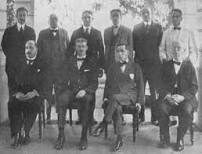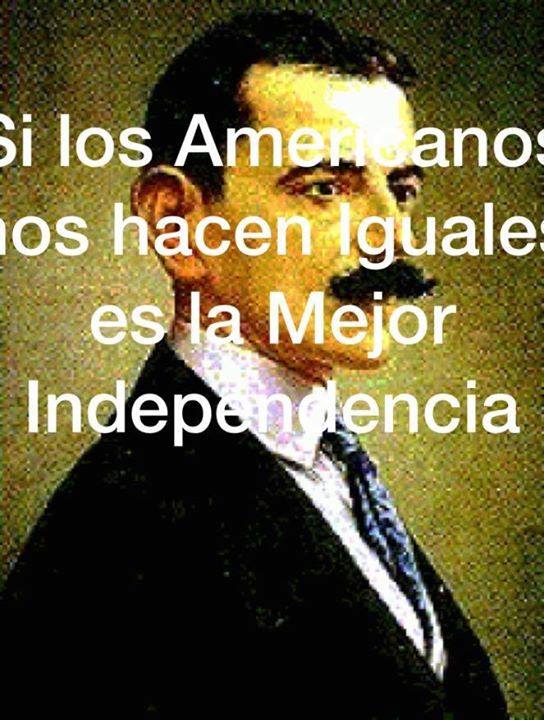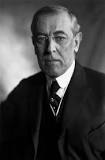
The 1917 Jones Act: Puerto Ricans as U.S. Citizens
{Leopoldo Figueroa Carreras explicaba el por qué todos los Puertorriqueños, salvo 288 favorecieron la Ciudadanía Americana (13 murieron sin ella) y José de Diego votó a favor “Porque si los Americanos nos hacen Iguales, esa es la Mejor Independencia Posible”.}
The 1917 Jones Act: Puerto Ricans as U.S. Citizens
January 30, 2011 by Julito Varela
I wrote this piece in 2011. It still resonates today.
The history of Puerto Rico is complex. As the island enters its 113th year as a territory colony of the United States, the interdependencies between the U.S. and Puerto Rico weren’t, and never will be, a simple matter. It is a history of paradoxes and complications regarding political identity and basic human rights of self-government.

Puerto Rico’s first administrative cabinet under the Jones Act of 1917
Take, for example, the 1917 Jones Act, an act of Congress that granted U.S. citizenship to all Puerto Ricans born on the island. (Important sidenote: Unknown to many, this is not a Constitutional act, but it would take a Supreme Court act to revoke the right.) The Jones Act, signed by President Woodrow Wilson on March 2, 1917, not only established U.S. citizenship for Puerto Ricans on the island, it also created a new form of government. As the following states (source: Library of Congress):
The Jones Act separated the Executive, Judicial, and Legislative branches of Puerto Rican government, provided civil rights to the individual, and created a locally elected bicameral legislature. The two houses were a Senate consisting of 19 members and a 39-member House of Representatives. However, the Governor and the President of the United States had the power to veto any law passed by the legislature. Also, the United States Congress had the power to stop any action taken by the legislature in Puerto Rico. The U.S. maintained control over fiscal and economic matters and exercised authority over mail services, immigration, defense and other basic governmental matters.
There are so many contradictions in the act that many people are unaware about and we would like to make some clarifications:
- Even though Puerto Ricans have the right to govern themselves, in the end the Governor of Puerto Rico and the U.S. government still have to power to veto and control any legislation on the island. That is a huge concession of power and rights.
- History has stated that Puerto Ricans did not request for citizenship at the time. In fact, the member of Congress representing the island in 1917, Luis Muñoz Rivera, questioned such imposition in late 1916, basically telling Congress that Puerto Ricans would prefer Puerto Rican citizenship.
- The U.S. still has control over several basic government services that in any other form of government, would be under the jurisdiction of a local government. In the end, Puerto Ricans gained U.S. citizenship, but never gained much more, except for the right to freely travel with a U.S. passport and also freely live in any other part of the United States.
- History also suggests that the United States needed more men for WWI. After Wilson signed the Jones Act and after the U.S. entered World War I in 1917, military conscription was passed in June, 1917. This meant that as U.S. citizens, eligible Puerto Rican males were drafted into the armed forces. Over 2,000 Puerto Ricans were drafted to serve at the very beginning. In the end, it was estimated that 18,000 Puerto Ricans served in World War I. Most of them went to the Panama Canal, but some Puerto Ricans, like musician Rafael Hernández, proudly served on the Western Front. Puerto Ricans who were not eligible were sent to labor camps in the South.
The issue of U.S. citizenship for Puerto Ricans has always been a study in paradoxes. For example, a Puerto Rican-born individual who lives in the United States could vote in U.S. elections, like the ones for President, but that same person could not vote in those elections if living in Puerto Rico. The same goes for federal taxes. If you are Puerto Rican-born and live in the U.S., you have to file a federal tax return. On the island, though, a Puerto Rican does not have to file a return.
In general, it is safe to say that most Puerto Ricans value the benefits that a U.S. citizenship has bestowed on them. However, Puerto Ricans still fall into a second tier of U.S. citizens, when compared to their fellow American citizens. Issues of civil and human rights (noted by the U.S. crackdown on Puerto Rican Nationalists who never truly had the right to free assembly after tensions arose in the 1940s and 1950s) are still valid concerns.
As the island begins to yet again explore the political direction it wants to take, the question of whether Puerto Ricans would trade in their U.S. citizenship for Puerto Rican citizenship will always be open for debate and dissection. Four generations have passed since the Jones Act became law, and for a certain group of U.S. citizens, full constitutional rights have yet to be achieved.

